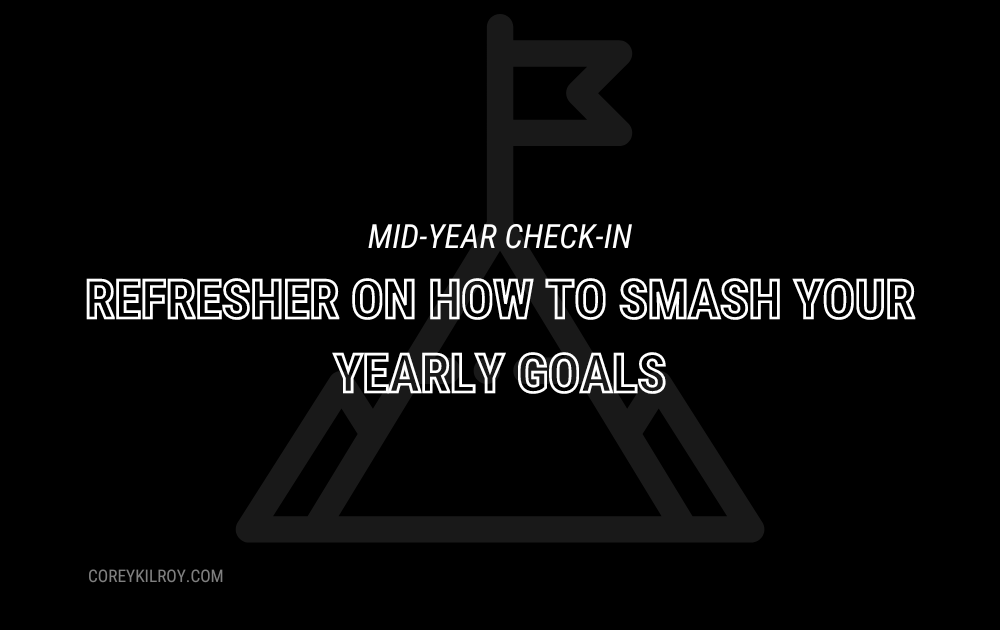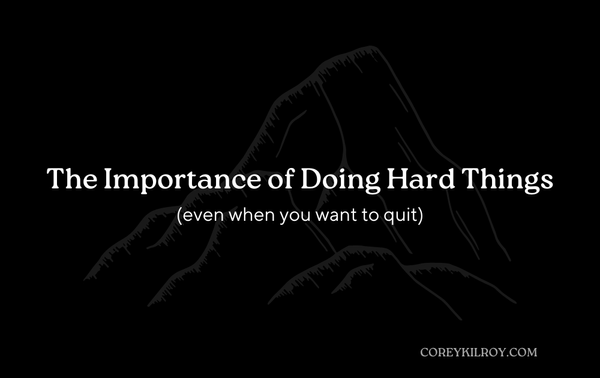6 Month Check-In: Proven Strategies to Smash Your Yearly Goals

We’re officially halfway through the year!
Time flies when you’re busy smashing goals, right? Or maybe you’ve hit a few bumps along the way and need a little push to get back on track.
There are many of you that haven’t made any progress with your goals.
Myself included.
The problem is, many people set resolutions and arbitrary goals at the beginning of the year, but don’t know how to plan for success.
Let’s revisit the art of goal setting to help you realign and reignite that fire to achieve everything you set out to do this year.
How to Set Goals
Here’s a step-by-step refresher on how to set goals effectively.
To achieve your goals, you should break them down into a hierarchy of levels:
1. Start with Large-Scale Goals
Think about what you want to achieve over the next 10 years. These goals give you a grand vision and help shape your decisions.
2. Break Down Larger Goals
Divide your big goals into smaller, more manageable targets. For example, if you want to lose 20 lbs this year, aim to lose 1 lb each week.
3. Execute Daily
Commit to your plan every day. Consistency is key to achieving long-term success.
Step 1: Setting large-scale goals
The first step to setting your goals is to list out every goal that you’d like to achieve in your lifetime.
Setting larger goals will give you a grand perspective on what your life may be like and shapes your decision making for the future.
💡 Categories to Consider
To cover all significant areas of your life, think about setting goals in the following categories:
- Career: what do you want to achieve in your career? What are you going to do for a living that means the most to you?
- Financial: How much do you want to earn, and by what stage of your life? Related to career?
- Education: Is there any knowledge you wish to acquire specifically? What skills do you wish to obtain in order to reach your goals?
- Family: Do you want to be a parent? If so, how are you going to raise your children? How do you want to be perceived by your partner or extended family?
- Attitude: Is any part of your mindset holding you back? Is there any part of the way that you behave that you dislike? (If so, how can you improve?)
- Physical: - Are there any athletic or fitness goals you wish to achieve? Do you want to be in good health at an old age? How can you achieve this?
Step 2: Break Larger Goals into Smaller Targets
Once you have those larger-scale goals set in place, break those down into more achievable targets that can be accomplished over time.
Take your larger goal and set a five-year plan for smaller goals that you need to complete in order to reach your larger goal.
After, create a one-year plan, six-month plan, one-month plan, and so forth of progressively smaller goals that you should reach to achieve your larger-scale goals.
Each of these smaller targets will be based on the previous plan.
Get it?
💡 How to Prioritize Goals
In order to prioritize which goal to work on first, author of the book, The ONE Thing, Jay Papasan, broke it down perfectly.
- To start, write down about 20-25 goals that you wish to accomplish.
- Then choose 5-10 of those goals you wish to achieve first, or is of most priority.
- Now, rewrite a list of those 10 goals. Then, circle the ONE thing that takes most priority and can be accomplished first.
- After, repeat this process until you have 3-5 of your MOST important tasks that can be accomplished the soonest.
Now you have a priority list of the top 5 tasks that need to be accomplished first, starting with number ONE. Now go execute that first goal (Step 3).
Be Precise with You Goals
SMART goals are also extremely useful when thinking about goal setting.
If you want an in-depth review on SMART goals, you can read my How to Use SMART Goals essay here.
But for now, here’s a quick refresher.
SMART Goals are statements of specificity that explain what you are working to accomplish.
This ultimately makes your goal more precise and creates a plan for you at the same time.
It can be broken down by the mnemonic – you guessed it… SMART:
- Specific: What will be accomplished? What actions will you take?
- Measurable: What data will measure the goal? How much? How well?
- Achievable: Is the goal doable? Do you have the necessary resources to accomplish this?
- Relevant: How does the goal align with broader goals? Why is the result important?
- Time-Bound: What’s the time-frame for accomplishing this goal?
Extended Tips for Setting Goals
✔️ 1. Achievable vs unachievable goals: It’s important to set goals that you can achieve.
Bosses at work, friends, or even family, can set unrealistic goals for you. This is often done in ignorance to your own desires and ambitions.
It’s still important, however, to set goals that seem like you’re “shooting for the stars” and off into the distance.
This is because if that larger-sale goal is TOO achievable, then you’ll never know if you’re able to actually execute and achieve it.
Also, this works because if you don’t achieve them just yet, you’re still well ahead of where you thought you would be.
✔️ 2. State each goal as a positive statement: Express your goals positively. (saying “execute this step well” is much better than, “don’t make this stupid mistake”.
✔️ 3. Write down your goals: Writing your goals down solidifies them into existence and gives them more force.
Write it on a sticky not, on your mirror, as a post on social media, or make it your lock screen. Just put it out into existence to hold yourself accountable.
✔️ 4. Set performance goals, not outcome goals: You should set goals where you have as much control as possible.
It can be very disheartening when you fail to achieve a goal for reasons that are beyond your control.
If you base your goals on personal performance, then you can keep control over the achievement of them, and bring satisfaction to them.
Achieving Your Goals
When you’ve achieved one of your goals, please take the time to enjoy the satisfaction from doing it!
With the experience and knowledge gained from achieving this goal, review the rest of your plans:
💭 If you achieved this goal too easily, then reevaluate and make the next goal harder.
💭 If the goal took a disheartening length of time to accomplish, then make the next goal a bit easier.
💭 If you learned something that would lead you to change your other goals, then do so!
💭 If you noticed a deficit in your skills despite achieving the goal, decide whether to set more goals to fix this.
In the end…
It’s only 6 months into the year. You have a whole other set of 6 months ahead of you.
And in the grand scheme of things, New Year’s resolutions and arbitrary time lines are meaningless.
No matter how long it takes - and as long as you remain committed and consistent toward achieving your goals - you're working toward an aspiration in life and that’s all that matters.
Keep Pluggin. You got this.
-C.



